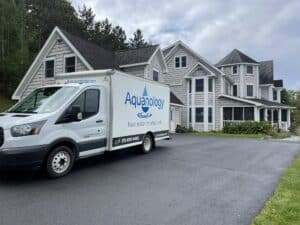
What Is Water Softener Salt Delivery
Water softener salt delivery is a convenient service that keeps your water softener running efficiently without the hassle of lifting and hauling heavy salt bags.
A salt free water conditioner system, also known as a scale reduction system, helps reduce the scale from hard water. They improve the lifespan of plumbing, faucets, and appliances by minimizing the damage caused by hard water scale.
Salt-free water conditioning technology is becoming increasingly popular, since homeowners are interested in quality water with less effort required.
Aquanology is a locally owned and operated business, and water softening, conditioning, and filtration is our specialty. Our years of experience have accustomed us to the challenging water that local families and business owners in Upstate NY face every day.
Salt-free water conditioner systems change how minerals form scale. This helps prevent buildup on faucets, plumbing, water heaters, and appliances. Since the hardness minerals calcium and magnesium remain in the water, we do not consider the water soft.
The popular explanation on how salt-free scale reduction systems work is the theory of template-assisted crystallization (TAC for short), or also commonly referred to as nucleation-assisted crystallization. In this understanding, the hardness ions change form, in which they are less likely to stick to surfaces and cause scale. This helps to keep the hardness minerals flushed out of the plumbing and fixtures.
Do not confuse whole-house salt-free water conditioners with whole house water softeners. Water softeners filter the water as it comes into your home, usually accompanied by a salt bin. These units use small resin beads in the softener tank. These beads attract and remove hard minerals like calcium and magnesium. They replace these minerals with soft sodium. This is why water softeners are also called ion exchange systems and use salt to regenerate.
A few years ago, many companies sold systems as salt-free water softeners. Then, industry rules changed. Now, only systems that remove hardness qualify as softeners. For more information on comparing salt-free systems and water softeners, read our blog.
Salt-free water conditioning systems mainly help reduce scale buildup in plumbing, fixtures, appliances, and water heaters. Since the result is less buildup, this results in better longevity for these water-using devices.
Since there is no salt to replenish and no brine or wastewater discharge, the salt-free system is often looked at as an eco-friendly alternative to a traditional water softener, in some cases.
Salt-free systems are also simpler in design, which means the upfront cost is often less than alternative water softeners.
No salt replenishment means easier, regular upkeep for the homeowner. Salt-free conditioning systems usually need new scale reduction media installed every 3 to 5 years. This can be expensive, but the big plus is the fact that there is no monthly maintenance required.
Calcium and magnesium in water, while they cause unsightly hardness buildup, are considered by some to be “healthful.” Salt-free systems maintain these minerals and simply change the properties of the elements to reduce their scale-forming potential.
Traditional water softeners add sodium in place of the hardness minerals. This may be a problem for those on low-salt diets or similar health challenges. Drinking softened water may not be an option for them
Although water hardness is not removed, it may help to keep skin and hair healthier than untreated hard water. However, a true water softener tends to have the ultimate benefit for skin and hair health enhancement.
We install a system that will serve you well for years. Your system is backed by an excellent manufacturer’s warranty and our company’s performance guarantee. We offer a full line of scheduled maintenance services, as well as our “just a phone call away” phone support and service for emergencies that may arise.
Embrace the change towards cleaner, safer water with Aquanology’s salt free water conditioning systems.
Contact us today to find the perfect water conditioning solution for your home.
Ready to protect your home from scale invasion by water? Scale reduction systems offer a low upfront cost and a low maintenance system to keep your plumbing and appliances working well if you have minor hardness concerns.
Aquanology invites you to reach out and schedule a free consultation, where we can help you decide on the best water softener system for your “better water” experience.
Here’s to compare ion exchange (salt based) vs. conditioning (salt free) systems. Since Aquanology offers both setups, we can provide education as to which may be the better option for you.
Water softeners produce truly soft water, better soap lathering, and virtually eliminate water hardness scale. Water softeners are also effective across a wider range of water qualities than salt-free conditioners.
Salt free conditioners have a lower upfront cost, don’t require salt replenishment maintenance, and don’t waste water.
A salt-free system may serve as an option when people can overlook some of its performance downsides in favor of the benefits of less regular maintenance.
For a true “salt-free water softening” experience, a whole house reverse osmosis system is a definite option, since reverse osmosis (RO) technology removes hardness minerals by physical filtration rather than ion exchange. Consult us to learn about whole house RO options, or read our Whole House RO Systems: What Homeowners Need to Know blog to learn more.
Most standard salt-free water conditioners work on a similar basic principle. The water flows through a fine sand-like media inside a filter tank or filter housing. Here is where all the work takes place: the water hardness minerals have their molecular arrangement altered so that they do not cause the hard, crusty calcite build-up as quickly.
How this chemistry method actually works is rather controversial. Here are two varying explanations:
The most common explanation is the following: the hardness minerals are changed into “insoluble nano-crystals” using Template Assisted Nucleation (TAC) technology. These crystals pass through the plumbing, fixtures, and appliances, and go harmlessly down the drain.
However, some top water specialists strongly disagree with the above theory. Alternatively, they explain that as the water passes through the salt-free water conditioner system, the conditioning media adds a minute amount of a compound into the water, which works as an antiscalant. This changes the hardness minerals from the tough scaling-building form to a softer form, which minimizes buildup and allows the water flow to flush them through the plumbing.
Regardless of on what chemical mechanism the salt-free conditioners function, it’s obvious that they do work at reducing scale. And it does all this work without using salt, and without altering the TDS. Because salt-free systems provide basic filtration, they do not alter the pressure or flow rate if sized correctly.
For in-depth information, read our blog How to decide: Salt-Based Water Softener vs. Salt-free Water Conditioners.
The first three most important things to consider before purchasing a salt-free conditioning system are water quality, water quality, and water quality. Yes, it’s that critical. Salt-free systems do not function well on all water types.
Key water quality parameters to keep in mind are total alkalinity, pH, and total hardness, as these levels directly affect the function of salt-free systems. Additionally, salt-free conditioners are virtually ineffective at reducing elevated levels of iron and manganese, so if those metals are a concern, a salt-free system may not be a great fit.
When you try to protect water heaters, you should note the temperature to which the water heats. If you heat water to high temperatures, as in commercial applications, salt-free scale reduction systems will begin to lose effectiveness.
As always, keeping in mind your household size, flow rate needs, and plumbing requirements should be taken into consideration.
Remember, Aquanology is here to assist you with water testing, custom recommendations, and specialized guidance.
Salt-free systems work in certain water quality parameters. Keep in mind that they do not perform the same as water softeners, so the end performance is not the same.
While the water may feel slightly different after using a salt-free conditioner, it will not feel the same as water softened with a true water softener.
Yes, a salt-free system can work great with well water, provided the raw water is in line with the water quality parameters. Keep in mind that salt-free systems struggle with iron and manganese, which commonly occur in well water.
Salt-free systems should last 20-30 years with proper maintenance, which generally only involves replacing the scale reduction media every 3-5 years.
Salt-free systems are specifically for changing hardness minerals to prevent scale buildup and do not work well for multiple contaminants. However, some common system designs couple carbon filtration with the removal of additional contaminants, such as chlorine.

Water softener salt delivery is a convenient service that keeps your water softener running efficiently without the hassle of lifting and hauling heavy salt bags.

A water softener is an essential system for homes with hard water, preventing mineral deposits in pipes, appliances, and water fixtures. But like any appliance,

Water softeners play an essential role in improving water quality by removing hard minerals like calcium and magnesium. With softer water, appliances work more efficiently